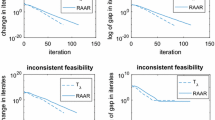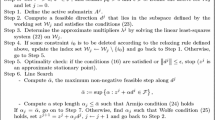Abstract.
In the vicinity of a solution of a nonlinear programming problem at which both strict complementarity and linear independence of the active constraints may fail to hold, we describe a technique for distinguishing weakly active from strongly active constraints. We show that this information can be used to modify the sequential quadratic programming algorithm so that it exhibits superlinear convergence to the solution under assumptions weaker than those made in previous analyses.
Similar content being viewed by others
Author information
Authors and Affiliations
Additional information
Received: December 18, 2000 / Accepted: January 14, 2002 Published online: September 27, 2002
RID="★"
ID="★" Research supported by the Mathematical, Information, and Computational Sciences Division subprogram of the Office of Advanced Scientific Computing Research, U.S. Department of Energy, under Contract W-31-109-Eng-38.
Key words. nonlinear programming problems – degeneracy – active constraint identification – sequential quadratic programming
Rights and permissions
About this article
Cite this article
Wright, S. Constraint identification and algorithm stabilization for degenerate nonlinear programs. Math. Program., Ser B 95, 137–160 (2003). https://doi.org/10.1007/s10107-002-0344-8
Issue Date:
DOI: https://doi.org/10.1007/s10107-002-0344-8




